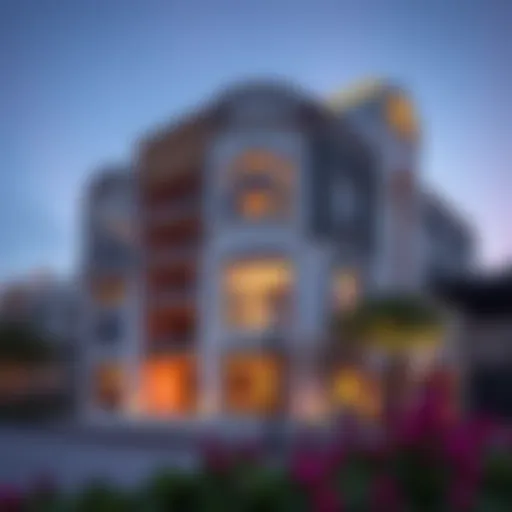Analyzing Mulkiya Renewal Costs in Dubai's Real Estate


Intro
Navigating the vibrant landscape of Dubai's real estate can feel like walking through a maze. Among the many terms you’ll encounter, Mulkiya holds significant weight. For property investors, homebuyers, and those simply interested in the market, understanding what Mulkiya signifies is pivotal. It isn't just a piece of paper; it's your gateway to legal ownership and the heart of property transactions.
When looking into Mulkiya renewal prices, it's not merely about numbers. Consider this: is the cost justifiable given the property's location and potential future value? With Dubai's constantly shifting dynamics, the answer often sits at the intersection of savvy decision-making and market comprehension.
In this article, we’ll explore the nuances of Mulkiya renewal prices. From the procedural labyrinth to associated costs and market trends, let’s peel back the layers.
Market Trends and Insights
Current Trends in Dubai Real Estate
Dubai's real estate sector is a blend of tradition and modernity, showcasing a stunning array of property choices. The last few years have witnessed a surge in demand, particularly for off-plan properties, thanks to favorable mortgage policies and investor-friendly regulations. Current trends highlight strong interest in mixed-use developments, where residential, commercial, and leisure spaces converge seamlessly.
People are also hiking towards sustainability. Properties tapping into green technologies, eco-friendly materials, and smart home systems are not merely fads; they are shaping a new standard. Investors are no longer looking just for luxury; they want a sustainable lifestyle that aligns with global environmental goals.
Furthermore, the buyer demographic is evolving. With an influx of expats flocking to Dubai, the demand for affordable housing remains robust. Areas that offer value for money, especially in the outskirts of business hubs, are thriving.
Predictions for Future Market Developments
When gazing into the crystal ball, industry experts predict sustained growth. Increased governmental support, infrastructure projects, and global events like Expo 2020 have posited Dubai as a magnet for international investments. The sense is that the short-term volatility due to economic factors may pave the way to long-term stability.
Investments in further transport systems, like the extension of the metro and hyperloop plans, will likely enhance accessibility, driving property prices upward. Nets of connectivity could transform less popular areas into highly sought-after options, thus expanding the potential market for Mulkiya renewals.
"The future of Dubai’s real estate lies in its adaptability. Forward-thinking investors will recognize opportunities before they become mainstream."
Developers are also eyeing the burgeoning interest in wellness and luxury living. Properties designed with lifestyle amenities – think spaces for yoga, organic markets, and community gardens – are likely to rise in demand, making them prime candidates for significant Mulkiya renewal costs.
As we steer through the current landscape and hold out a hopeful vision for the future, understanding the costs tied to Mulkiya renewal becomes instrumental for anyone looking to thrive in Dubai's real estate marketplace.
Prologue to Mulkiya Documents
Understanding the nuances of Mulkiya documents is essential for anyone engaging with Dubai's vibrant real estate market. These documents serve not simply as bureaucratic paperwork, but as a crucial linchpin in property ownership. Without a grasp of what Mulkiya represents and its implications, investors, homebuyers, and realtors may find themselves navigating a labyrinthine system fraught with potential pitfalls.
The significance of Mulkiya documents comes into sharp focus when considering the procedures tied to property transactions. They exhibit ownership authenticity and establish a legal framework for transactions. Not having these documents, or failing to renew them appropriately, can lead to complications that many buyers or investors might overlook.
In this article section, we will delve deeper into defining the concept of Mulkiya and then discuss its indispensable role in property ownership. The interplay between legal norms and the practical applications of these documents sets the tone for a more informed and strategic approach to real estate transactions in Dubai.
The Renewal Process Explained
The renewal process of Mulkiya documents is vital for those involved in Dubai's ever-changing real estate landscape. Without a clear understanding of this procedure, property owners may run into unexpected hurdles that could complicate their ownership status. From investors who wish to leverage their property to expats looking to secure a home, knowing the ins and outs of Mulkiya renewal helps provide a solid foundation in property transactions.
Engaging in this process ensures that property titles remain valid and that owners can enjoy their rights without legal complications. The procedure might seem daunting, but breaking it down into manageable steps demystifies the entire experience. Let’s dive deeper into how one can navigate this crucial aspect of property ownership.
Step-by-Step Guide to Mulkiya Renewal
Renewing your Mulkiya can seem like a tall task. Here is a step-by-step approach to simplify the process for you:


- Gather Required Information
Before you start the renewal, it's essential to collect necessary property details. These typically include property location, owner’s ID, and original Mulkiya document. - Visit a Real Estate Authority Office
You will need to head over to the Dubai Land Department (DLD) or a designated real estate authority office. Familiarize yourself with their process, as procedures may vary across different offices. - Submit the Application
Complete your application form and submit it alongside the required documents. Make sure all information is correct to avoid delays. - Payment of Renewal Fee
There's usually a fee involved; ensure you are ready to pay this as it's crucial for processing your application. - Obtain Updated Mulkiya
Once approved, you’ll receive your renewed Mulkiya. Check for any errors immediately upon receipt.
This structured approach not only makes the renewal process less intimidating but also ensures you won't miss any critical steps.
Necessary Documentation for Renewal
To ensure a smooth renewal, prepare the following documentation:
- Original Mulkiya Document: This is your key piece of evidence that shows ownership. Make sure it's not lost.
- Government-issued ID: A passport or Emirates ID works fine for identification.
- Proof of Payment: Keep receipts of any fees paid during the application process, as you might need to present these.
- No Objection Letter from the Financier: If your property is mortgaged, a no objection letter from your bank or financial institution is essential.
"Investing time in preparing the right documents can save you headaches in the long run."
Understanding and organizing these documents beforehand saves time and frustration later on. Ensure that all details are accurately filled to reduce the chance of paperwork issues during the renewal stage.
By grasping the renewal process with clarity and confidence, you position yourself for a seamless experience in Dubai's real estate realm.
Current Mulkiya Renewal Prices
Understanding Mulkiya renewal prices is vital for anyone involved in Dubai's real estate scene. Whether you're an investor looking to expand your portfolio, a homebuyer navigating the complexities of property ownership, or a realtor advising your clients, knowing the costs associated with renewing your Mulkiya directly impacts your financial planning and decision-making.
In Dubai, where the real estate market is as vibrant as a busy souk, the prices for Mulkiya renewals can fluctuate based on various factors. It’s not just about paying a fee; it’s about ensuring that your property remains legal and compliant with local regulations. As the market evolves, keeping abreast of these renewal costs can save headaches—or worse, financial loss—down the line.
Factors Influencing Renewal Costs
A variety of elements determine how much one might face when renewing a Mulkiya. Among the most significant are:
- Property Type: Residential vs. commercial properties often come with different renewal fees. A high-end villa will likely cost more to renew compared to a basic apartment.
- Location: Properties in prime areas, like Downtown Dubai, tend to incur higher renewal fees than those situated farther from the city center.
- Regulatory Changes: Government regulations can impact prices. If the authorities adjust fees or introduce new requirements, it may reflect in renewal costs.
- Market Conditions: If the property market is booming, you might expect higher costs due to increased demand for Mulkiya renewals.
"Awareness of these factors can equip property owners with the knowledge necessary to anticipate changes in renewal fees and adapt accordingly."
Average Prices Across Different Property Types
The average prices for renewing Mulkiya documents can vary widely. Here’s a breakdown:
- Residential Properties: The renewal fees typically range from AED 1,500 to AED 5,000, depending on the size and location of the property.
- Commercial Properties: For businesses, this can range substantially, often from AED 3,000 to AED 10,000 or higher, which factors in the property's operational potential.
- Luxury Developments: Properties within gated communities or high-end areas may see renewal costs reaching upwards of AED 15,000.
In summary, knowing the Mulkiya renewal prices and their influencing factors can empower property owners, guiding their choices in a way that secures their investments and aligns with market dynamics.
Understanding the Legal Framework
The legal framework surrounding Mulkiya renewal in Dubai's real estate landscape serves as the backbone of property ownership rights and responsibilities. Understanding this framework is crucial for property owners, buyers, and investors alike. It's not just about having the right document; it’s about ensuring compliance with regulations and knowing one’s rights. Missteps here can lead costs that aren’t just financial but can impact one’s ability to manage property effectively.
Let’s delve into the specifics of the laws and regulations governing Mulkiya documents and how government bodies play an essential role in the renewal process.
Relevant Laws and Regulations
Several laws frame the legal context for Mulkiya documents in Dubai. These regulations dictate the rights of property owners, responsibilities during renewals, and the essential processes involved in property transactions. Here are the key legal points to keep on your radar:
- Real Estate Registration Law: This law outlines the registration processes for properties in Dubai. It emphasizes the importance of keeping records up to date, which directly affects the process of Mulkiya renewal.
- Law No. 7 of 2006: Governing property ownership in Dubai, this law is crucial for any property transaction. It specifies the rights and obligations of property owners, ensuring clarity during the renewal process.
- Property Lease Law: This outlines terms and conditions under which properties can be leased, directly affecting the renewability of Mulkiya documents. Understanding these terms prevents future disputes.


Understanding these laws isn’t just for peace of mind—it is also key to legally protecting your investment and ensuring your property remains compliant. Ignorance can be costly, so it pays to be informed.
Role of Government Authorities in the Renewal Process
Government authorities are pivotal in the Mulkiya renewal process. In Dubai, entities such as the Dubai Land Department play vital roles. They ensure the integrity of real estate transactions and always safeguard the legal standing of properties.
Their responsibilities include:
- Document Verification: Before processing a renewal, they authenticate the legitimacy of the documents submitted. This step helps prevent fraud and disputes.
- Fee Collection: Government bodies are also responsible for collecting the appropriate fees for renewal. This process is transparent and crucial, as it directly ties back to the services provided by the authorities.
- Policy Enforcement: They dictate the policies that govern the property market, ensuring all stakeholders adhere to the regulations, thereby maintaining market stability.
Government authorities act as the gatekeepers of property law, ensuring that all processes are fluid and free from hindrances, thereby promoting a trustworthy environment for all parties involved.
Engaging with these authorities may seem burdensome, but understanding their role can facilitate smoother transactions and renewals. Ultimately, comprehending the legal landscape aids in making well-informed decisions and sharpening your competitive edge in Dubai's vibrant real estate market.
Comparative Analysis of Mulkiya Renewal Costs
A comparative analysis of Mulkiya renewal costs is pivotal when navigating Dubai's real estate waters. Understanding the variances in prices not only sheds light on the current market but also equips property owners and investors with essential information to make enlightened decisions. This section delves into two key aspects: the regional variations in renewal prices and the impact of market trends on overall pricing. These components serve as vital indicators in assessing one's investment strategy in the competitive landscape of Dubai real estate.
Regional Variations in Renewal Prices
When it comes to regional variations in renewal prices, the differences can be considerable. Investors and homeowners need to grasp how location impacts these costs significantly. For instance, properties situated in prime areas like Downtown Dubai, Jumeirah, or the Palm Jumeirah have been known to command higher renewal fees due to their high demand and luxurious appeal. Conversely, less sought-after locations, though still desirable, display lower costs.
Key factors influencing these regional discrepancies include:
- Demand and Supply: Areas with booming construction and many available properties often see more competitive pricing, reducing general renewal costs.
- Type of Property: High-rise buildings and luxury villas may attract different fee structures than mid-range apartments or duplexes, reflecting their market positioning.
- Local Governance: Different districts may impose varied regulations and taxation systems affecting renewal fees. For example, if a region adopts stricter inspection protocols, it could result in higher associated costs.
These factors create a mosaic of pricing patterns across Dubai that potential investors must scrutinize. A greater understanding of these regional nuances helps buyers strategically evaluate properties, ensuring a sound investment.
Impact of Market Trends on Pricing
Shifting gears, let’s explore the impact of market trends on pricing within the realm of Mulkiya renewals. The real estate market is like a living organism; it evolves based on several influences, both internal and external. Emerging trends can shift renewal costs, often in tandem with broader economic indicators.
Some of the most salient trends affecting pricing include:
- Economic Fluctuations: A robust economy generally leads to rising property prices, which can, in turn, elevate renewal costs. For instance, if new developments attract a surge of expats and investors, the heightened competition can push prices up.
- Legislative Changes: Adjustments in laws governing property ownership can suddenly alter the landscape. An example might include changes in fees for Mulkiya renewals based on government mandates aimed at enhancing regulatory practices.
- Future Developments: Upcoming infrastructures, such as new metro lines or commercial hubs, often cause speculative spikes in property values. Anticipated growth can result in increased demand, thus inflating renewal costs.
"Market trends operate like tides; they shift insidiously but can significantly alter the landscape when they do."
In essence, keeping an eye on these trends is invaluable. Insight into them allows investors and homeowners alike to better align their financial goals with the market's realities, leading to optimal performance in their investment endeavors.
Case Studies on Mulkiya Renewal
In the realm of Dubai's real estate, the Mulkiya document plays a pivotal role. It not only serves as proof of ownership but also as a key to navigating the often complex renewal processes. Analyzing specific case studies regarding Mulkiya renewal brings to light a wealth of insights. These case studies provide tangible examples that illuminate both successful approaches and the pitfalls to avoid, making them essential for investors, homeowners, and real estate professionals alike.
One significant benefit of discussing real-life experiences is that it presents a clear path to understanding how various factors—be it market changes or regulatory updates—can affect the renewal process. Each case study serves as a learning opportunity, allowing readers to grasp the nuances and challenges that may arise when owners seek to renew their Mulkiya documents. This understanding is particularly crucial in a market as dynamic as Dubai's, where the tides can shift rapidly.
As we explore these case studies, it becomes evident that there isn’t a one-size-fits-all solution. Different property types, locality variations, and personal circumstances contribute to a unique set of challenges and successes for each case. Thus, having a repository of such examples enhances readers' knowledge and understanding, empowering them to make informed decisions in their own property journeys.
Successful Renewals: Lessons Learned


Consider the case of Ahmed, a property owner who successfully renewed his Mulkiya for a residential apartment in Dubai Marina. His experience showcased several valuable lessons. Firstly, Ahmed emphasized the importance of starting the renewal process early. By doing so, he was able to navigate potential bureaucratic delays without the added pressure of impending deadlines.
Furthermore, Ahmed made it a point to invest time in understanding the necessary documentation. He realized that one of the biggest hurdles is often the lack of required paperwork. By meticulously checking off his documents and ensuring everything was up to date, Ahmed sailed through the approval process, greatly reducing potential complications.
Several key takeaways from his case include:
- Start early—Allow sufficient time for any unexpected issues.
- Understand requirements—Know what documents are mandatory and keep them organized.
- Follow up regularly—Stay in touch with pertinent government offices to track the status.
Ultimately, Ahmed's story underscores the importance of preparation, keen awareness of the process, and proactive engagement with authorities.
Challenges Faced by Property Owners
On the flip side, there are countless stories like the one shared by Fatima, who faced significant hurdles while attempting to renew her Mulkiya. Fatima owned a commercial property and found the required legal language and regulations overwhelming. The difficulty began with the documentation itself, as she encountered a number of discrepancies that forced her to seek legal assistance. This situation not only extended the time frame for her renewal but also resulted in unforeseen costs.
One major challenge in Fatima's case was the constantly evolving legal landscape surrounding property ownership in Dubai. Regulatory changes can often come out of the blue, leaving property owners scrambling to adapt. Moreover, Fatima found that different governmental departments had varied interpretations of laws, which created further confusion during her renewal.
Her experience highlighted several potential pitfalls:
- Documentation discrepancies—Ensure accuracy to avoid delays.
- Lack of legal guidance—Seek professional help if unsure about the process or legal requirements.
- Regulatory confusion—Stay updated to grasp any recent changes in laws governing Mulkiya.
Through Fatima's challenges, it becomes clear that due diligence and keeping track of regulatory shifts are vital in the renewal process. The contrasting experiences of Ahmed and Fatima serve as a guiding light for prospective property owners, helping them navigate the waters of Mulkiya renewals with greater confidence.
Future Projections for Mulkiya Renewal Pricing
While examining Mulkiya renewal prices, it’s crucial to consider future projections. These projections can shape investments, expectations, and strategies in Dubai’s real estate market. Understanding where the prices may head in the coming months or years helps property owners and investors make well-informed decisions.
Expected Trends in Renewal Fees
When we look at the expected trends for renewal fees, a few factors come into play.
- Inflationary Pressures: As inflation continues to tick upward, properties may see their renewal fees adjusted accordingly. Investors may find that what they pay today won’t hold its value as the price index creeps higher.
- Demand and Supply Dynamics: If more people flock to Dubai for new opportunities, demand for housing will surge. With higher demand, property owners might increase renewal prices. This is a classic case of supply and demand. If there are more buyers than available properties, the fees will follow suit.
- Technological Advances: The introduction of new platforms for managing properties is also crucial. As technology becomes more entrenched, renewals may become easier and quicker, leading to potential cost-saving for owners that could translate into more favorable fees.
Furthermore, studies indicate that average Mulkiya renewal costs could see a steady rise in upcoming years due to these elements. Real estate analytics from institutions like Zillow and local market reports can give valuable insights into these trends.
Influence of Economic Factors on Pricing
Economic factors play a pivotal role in dictating the landscape of Mulkiya renewal prices. These forces range from government policies to global economic conditions.
- Local Economic Policy: The UAE government’s stance on taxation and property regulations significantly affects property costs. For instance, if the government introduces tax incentives for property owners, it may lower renewal fees as a competitive advantage. Conversely, higher taxes could cause fees to rise.
- Macroeconomic Indicators: Economic signals such as GDP growth, unemployment rates, and foreign investments can shift the real estate market. A burgeoning economy generally supports higher property values, which in turn influences renewal pricing.
- Global Events: Events like financial crises or significant geopolitical changes can create ripples in the local real estate market. For example, if a foreign investor suddenly pulls out of the Dubai market due to a global downturn, property prices, including renewal fees, could drop.
Culmination
The conclusion of this article serves as a pivotal component for readers seeking to grasp the complexity surrounding Mulkiya renewal prices in Dubai’s real estate market. Understanding this sector is not merely about grasping numbers; it’s about recognizing the intricate web of legal requirements, market trends, and economic factors that influence ownership and property investment decisions.
Recap of Key Insights
To summarize, several key insights can be drawn from our exploration:
- The Role of Mulkiya - Mulkiya documents are essential for establishing ownership and ensuring legality in property transactions within Dubai. Without proper documentation, property rights can become muddled, leading to potential disputes.
- Renewal Process - The renewal process involves several stages, requiring meticulous attention to detail. Every step, from documentation gathering to fees payment, carries weight in guaranteeing that one’s property remains legally secured.
- Cost Influencers - Factors such as property type, location, and current market conditions can significantly affect renewal prices. Recognizing these influencers aids investors in budgeting effectively.
- Legal Framework - Local regulations and the role of governmental authorities shape the landscape of property ownership. Staying abreast of these rules is not just informed decision-making; it’s essential for the safeguarding of one’s investment.
- Market Trends - Analyzing current trends and historical data gives foresight into future costs, allowing property owners and investors to strategize appropriately. This predictive aspect is invaluable for anyone involved in Dubai's real estate.
Final Thoughts on Mulkiya Renewal Overview
Navigating the realm of Mulkiya renewals may seem daunting at first, but an informed approach can demystify the process. The benefits extend past mere compliance with laws; they encompass a comprehensive understanding of personal investment, market health, and future possibilities.
As this bustling city continues to grow and evolve, so does its real estate market. It is crucial for investors, homebuyers, and realtors to remain vigilant, adapting to changes both in pricing and regulations. In doing so, they not only secure their investments but also contribute to the dynamic fabric of real estate in Dubai. The knowledge shared in this article equips stakeholders with the insights needed to navigate the Mulkiya renewal landscape efficiently and effectively.















